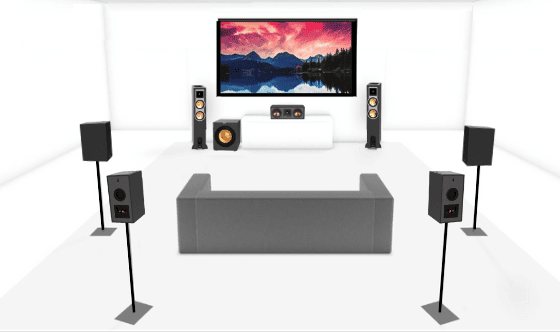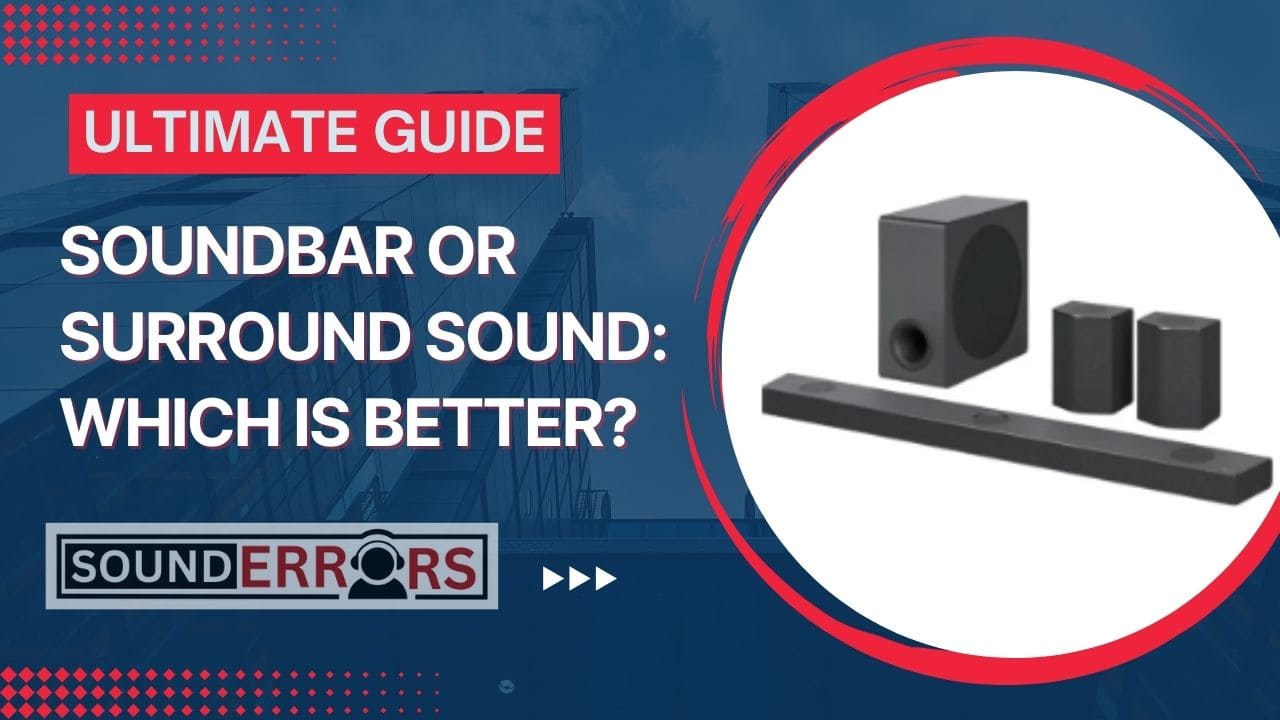This Post may contain affiliate links, when you purchase through links on our site, we may earn an affiliate commission at no extra cost to you. Here’s how it works.
When it comes to enhancing your home entertainment experience, the choice between a soundbar and a surround sound system is crucial. Both options offer different benefits. We’ll identify the features, advantages, and drawbacks of each system, helping you make an informed decision for your home theater setup.
Table of Contents
ToggleUnderstanding the Soundbars
A soundbar is a compact, elongated speaker system designed to enhance the audio quality of your television without the need for multiple speakers scattered around the room.

Key Features of Soundbars
- Design: Slim and stylish, soundbars are designed to fit seamlessly with your TV setup. Many can be mounted on walls or placed directly under the television.
- Connectivity: Most soundbars offer multiple connectivity options, including HDMI ARC, optical audio, Bluetooth, and Wi-Fi, allowing for easy integration with various devices.
- Smart Features: Some modern soundbars come with smart features such as voice control, built-in streaming capabilities, and compatibility with virtual assistants like Amazon Alexa or Google Assistant.
Pros of Soundbars
- Space Efficiency: Soundbars take up significantly less space compared to a surround sound system, making them an ideal choice for smaller rooms or apartments.
- User-Friendly Setup: Typically, soundbars can be set up in minutes with minimal cables, making them user-friendly, especially for those who are not tech-savvy.
- Affordability: Generally, soundbars are more budget-friendly than surround sound systems, providing a great audio upgrade without breaking the bank.
- Improved Sound Quality: Soundbars offer a noticeable improvement in sound quality over standard TV speakers, enhancing dialogue clarity and overall audio experience.
Cons of Soundbars
- Limited Immersion: While soundbars can simulate surround sound, they often cannot replicate the immersive experience of a multi-speaker setup.
- Dynamic Range Limitations: Soundbars may not deliver the same depth and bass response as dedicated subwoofers found in surround sound systems, potentially impacting the enjoyment of music and action scenes.
Understanding Surround Sound Systems
A surround sound system typically consists of multiple speakers strategically placed throughout a room, including a center channel, front left and right speakers, rear speakers, and a subwoofer. This setup aims to create an immersive audio experience.

Key Features of Surround Sound Systems
- Multiple Speakers: A standard surround sound setup includes at least five speakers and a subwoofer, often called a 5.1 system. More advanced setups can include additional speakers for enhanced audio effects (5.1, 7.1, or 9.1 systems).
- Audio Formats: Many surround sound systems support advanced audio formats such as Dolby Atmos, which allows for three-dimensional sound placement, further enhancing the immersive experience.
- Room Calibration: Higher-end systems often come with calibration technology that adjusts the audio output based on room acoustics, optimizing sound quality.
Pros of Surround Sound Systems
- Immersive Audio Experience: The spatial separation of speakers creates a truly immersive experience, allowing sounds to come from different directions, making movie-watching and gaming more engaging.
- Superior Audio Quality: Surround sound systems generally provide better sound quality and dynamic range, allowing for more nuanced and powerful audio reproduction.
- Customization Options: You can customize your surround sound setup based on your room size and personal preferences. Start with a basic configuration and expand over time.
- Cinematic Experience: For film enthusiasts, surround sound systems replicate the audio environment of a movie theater, adding depth and excitement to every scene.
Cons of Surround Sound Systems
- Complex Setup: Surround sound systems can be more complicated to set up, often requiring speaker placement considerations, calibration, and sometimes complicated wiring.
- Space Requirements: With multiple speakers, surround sound systems require more space, which can be a challenge in smaller living areas.
- Higher Cost: A quality surround sound setup can be a significant investment, especially when considering additional components like amplifiers and receivers.
Why Home Theater Surround Sound is Better Than a Soundbar
- True Immersion: Surround sound systems provide a 360-degree audio environment. This immersive quality is especially beneficial for films and gaming, where sound effects and music are critical to the experience. For instance, during an action scene, you might hear sounds approaching from behind, enhancing the overall realism.
- Dynamic Audio Range: A well-configured surround sound system, particularly with a dedicated subwoofer, delivers rich bass and clear highs. This allows for more vibrant music playback and a more profound cinematic experience, where the subtleties of sound design can be fully appreciated.
- Customization and Flexibility: With a surround sound system, you can start with a basic setup and expand as your needs change. You can add additional speakers, upgrade components, or incorporate smart technology as it becomes available, ensuring that your system evolves with your entertainment needs.
- Enhanced Audio Formats:
- Surround sound systems are often compatible with advanced audio formats like Dolby Atmos and DTS.
- , which provide three-dimensional soundscapes. This capability significantly enhances the listening experience, especially for action-packed films or immersive gaming.
- Long-Term Investment: While the initial cost of a surround sound system can be higher, it often provides a better long-term value for audio enthusiasts. As technology evolves, investing in a quality surround sound setup can future-proof your home theater experience.
Additional Considerations for Choosing Between Soundbars and Surround Sound Systems
When deciding between a soundbar and a surround sound system, several factors come into play beyond just the basic pros and cons. Here are additional topics to consider that may influence your decision.
Room Acoustics
- Room Size and Shape: The dimensions and layout of your room can greatly affect audio performance. Smaller rooms may benefit from the simplicity of a soundbar, while larger rooms might be better suited for a surround sound system.
- Acoustic Treatment: If you can control the acoustics in your room (like adding rugs, curtains, or sound panels), a surround sound system can take advantage.
Usage Scenarios
- Multimedia Experience: If you primarily watch movies and play games, choose a surround sound system. For casual TV viewing or music streaming, a soundbar is sufficient.
- Listening Preferences: Audiophiles or those who prioritize hi-fi audio may lean toward a surround sound system, while more casual viewers might be satisfied with the convenience of a soundbar.
Wired vs. Wireless
- Connectivity Options: Surround sound systems typically require more wiring and setup compared to soundbars, which often offer wireless options
- Interference and Signal Quality: If you live in a densely populated area with many wireless signals, a wired surround sound setup might be more reliable.
Brand and Ecosystem Compatibility
- Compatibility with Existing Devices: Check if the soundbar or surround sound system is compatible with your existing devices, such as streaming boxes, game consoles, and smart TVs.
- Future Upgrades: Consider whether the system you choose can be easily upgraded.
Audio Calibration and Settings
- Automatic Calibration Features: Many surround sound systems have calibration technology that optimizes speaker placement and adjusts settings based on room acoustics.
- Sound Profiles: Some soundbars offer customizable sound profiles for different types of content, like movies, music, or gaming, allowing you to tailor the audio experience to your preferences.
Conclusion: Choosing the Right Option for You
Ultimately, the choice between a soundbar and a surround sound system depends on your individual preferences, budget, and room setup.
- Soundbars are excellent for those looking for an easy, space-saving solution that still provides an upgrade from standard TV audio.
- Surround sound systems, on the other hand, are suited for those who seek an immersive audio experience akin to a movie theater. If you’re an avid movie watcher or gamer and have the space and budget for it, a surround sound system can transform your home entertainment experience.
In conclusion, identify your requirements, considering factors like room size, budget, and the type of content you consume.
